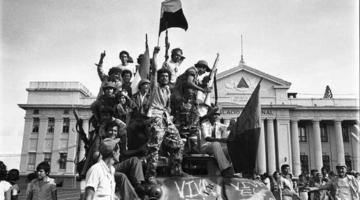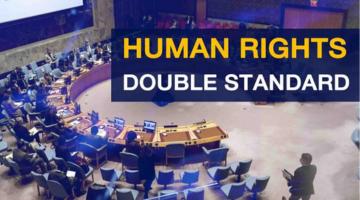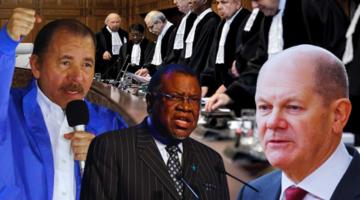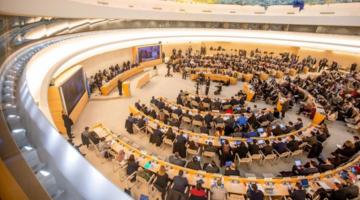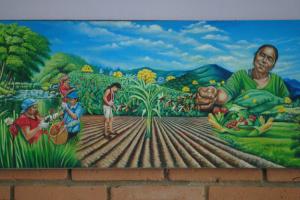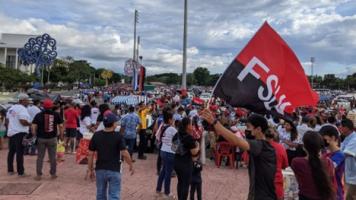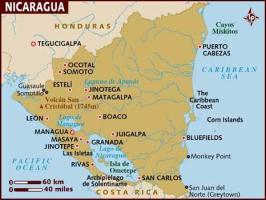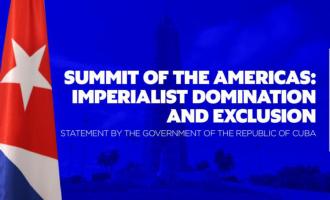The author examines postwar violence through the activism of Afro-Nicaraguan women and men from the Caribbean coast of the country.
“Gendered Black practices are sites of oppositional consciousness that drives resistance to the state and racial capitalism.”
In this series, we ask acclaimed authors to answer five questions about their book. This week’s featured author is Jennifer Goett. Goett is Associate Professor of Comparative Cultures and Politics at James Madison College, Michigan State University. Her book is Black Autonomy: Race, Gender, and Afro-Nicaraguan Activism.
Roberto Sirvent: How can your book help BAR readers understand the current political and social climate?
Jennifer Goett: Black Autonomy can help readers understand postwar Central America and the conditions that drive Black and Indigenous resistance in the region. Perhaps no other part of the world has endured such a long and devastating entanglement with US Empire. Still there remains a profound inability in the US to see Central America on its own terms; that is, from the vantage point of national history or popular sectors, much less via the experiences of racialized communities. Historian Greg Grandin calls this a kind of “imperial amnesia” that has rendered the region “hypo-real” in the popular imagination and intellectual thought. This unknowing persists as extractivism, ecological crisis, and state and structural violence make the region unlivable for the rural and urban poor who are then criminalized and caged when they seek refuge in the US.
The book examines postwar violence through the activism of Afro-Nicaraguan women and men from the Caribbean coast of the country. Their community is part of a large territory that is collectively titled to nine Black and Indigenous communities. But even with some of the most expansive multicultural citizenship rights in Central America, their lives are textured by violence. Their lands are undergoing colonization and deforestation at an alarming rate, and the state has militarized their territory, which is targeted for megaproject development. Women and men have responded to these conditions by embracing Black autonomy, a vital social practice based on race pride, territoriality, self-determination, self-defense, and mutual aid. Within the intimate spheres of community life, gendered Black practices are sites of oppositional consciousness that drive resistance to the state and racial capitalism. These practices encode valuable knowledge about right ways of living with one another and can serve as signposts for building a more just future.
What do you hope activists and community organizers will take away from reading your book?
Violence in the Americas is often hemispheric in its expression. The challenge is to understand how diverse and geographically disbursed forms of violence are part of a continuum that connects us to one another. Whatever your site of struggle, it likely impacts Black and Indigenous people in Central America. The immigrant detention industry, the militarized US/Mexico borderlands, racialized policing and the so-called war on drugs, climate change and ecological crisis, settler colonialism and dispossession, and labor exploitation under racial capitalism all curtail and cut short lives in these communities. And as some of the most marginalized people in the Americas, real formative justice for Black and Indigenous people from the region would require structural transformation with far-reaching effects beyond their communities.
An ability to see the connections between diverse sites of struggle in our hemisphere can help us build more powerful coalitions and hold political elites and corporate power accountable for their exploitation of people and the natural world. Social transformation, indeed, a livable planet, depend on mass transnational mobilization. As a white scholar-activist from the most hyper-consuming and power-hungry nation on earth, I know how easily coalitions are frustrated by inequalities within and between activist communities. Black Autonomy tracks the conditions that support and undermine coalitional struggle against racial and gender violence in Nicaragua in the hope that it can provide knowledge to support a more inclusive politics of liberation.
We know readers will learn a lot from your book, but what do you hope readers will un-learn? In other words, is there a particular ideology you’re hoping to dismantle?
Reformism, undue faith that liberal democracy and technocratic policies can address systemic violence and inequality. Most often we look to states for remedies. This isn’t always a bad route to pursue. There are better states and worse states. Better states can make real material differences in peoples’ lives. But states are and will remain problematic arenas for justice, especially for racialized groups. Currently, few, if any, civil and political rights are guaranteed in Nicaragua. This is a grave assault on the Nicaraguan people, and they are justifiably demanding the basic protections of liberal democracy and rule of law. But rights alone will not change the structural violence that plagues the region. There is no necessary relation between having rights and being empowered, equal, or free.
Black Autonomy shows how rights can be a strategic resource to political movements from below but are not an end in themselves. Rights may even support new kinds of unfreedom. Nicaragua has titled some 30 percent of national territory to Black and Indigenous communities in the last two decades. Territorial recognition is a significant achievement based on decades of struggle, but in some respects, it has empowered the state more than the communities. Titling, and the administrative arrangements that accompany it, bring the state into the communal sphere, influencing decision-making processes and providing new mechanisms to coopt territorial leadership. The state becomes the guarantor of “property” through multicultural recognition and thus expands its sovereignty over the region.
Who are the intellectual heroes that inspire your work?
The readings that have most shaped my thinking about power and revolutionary action are by Black feminists, particularly Patricia Hill Collins, Angela Davis, bell hooks, and Audre Lorde. Black Autonomy is grounded in their analysis of race, gender, class, and sexuality as mutually constituting forms of identification and inequality. It is through their work that I have learned to see all political processes and material relations as organized around and sustained by socially constituted and embodied difference. Revolutionary action depends on our ability to recognize and respond to this reality. Without this recognition, we cannot fully appreciate how power operates or foster an expansive politics of liberation.
Anticolonial and postcolonial theory, especially that of Frantz Fanon and Edward Said, has been similarly influential. Although Fanon did not theorize patriarchy as a source of colonial oppression, his rich descriptions of violence in Algeria show how class and gender structure racial domination under colonial rule. Fanon believed freedom could be achieved through mass mobilization, but he also warned us about the emerging neocolonial order, particularly the use of militarism to secure capitalist intensification. His work is highly translatable across region and time as is the work of Edward Said. For instance, Orientalism has helped me recognize the degree to which Central America, as an arena for US intervention, has shaped the form and content of the US imperial project.
My thinking about prefigurative politics and direct action is most shaped by David Graeber. His rejection of institutional power and emphasis on everyday relational practice as the glue for cooperation and solidarity have helped me to see the emancipatory potential of human sociality. His ideas are present throughout Black Autonomy.
In what way does your book help us imagine new worlds?
The violent structures of life in Central America are the result of decisions and policies that powerful people have made over time. But what they have wrought can be recast into more equitable, peaceful, and just societies. No one can turn back time or undo the past. But wealth can be redistributed. Land can be returned. We can extract less, produce less, consume less, and dramatically reduce CO2 emissions. We can disarm and demilitarize our societies. We can invest in communities and build social infrastructure instead of prisons. Societies can learn to love and value human and non-human life in all its brilliant diversity. Changing our relational orientation by listening to one another, cooperating, and engaging in mutual aid is one way to begin. Many communities are doing this transformational work, including the Afro-Nicaraguan community that the book chronicles. It took years of engagement and collaboration to fully appreciate their practice of Black autonomy as a self-valorizing political sphere—one that provides succor for the wisdom and resilience that exists in marginalized communities throughout the Americas, even those that have long been plagued by violence.
Roberto Sirvent is editor of the Black Agenda Report Book Forum.
COMMENTS?
Please join the conversation on Black Agenda Report's Facebook page at http://facebook.com/blackagendareport
Or, you can comment by emailing us at comments@blackagendareport.com

